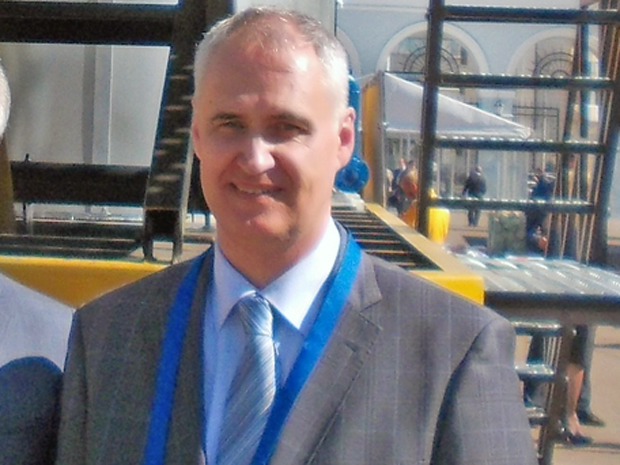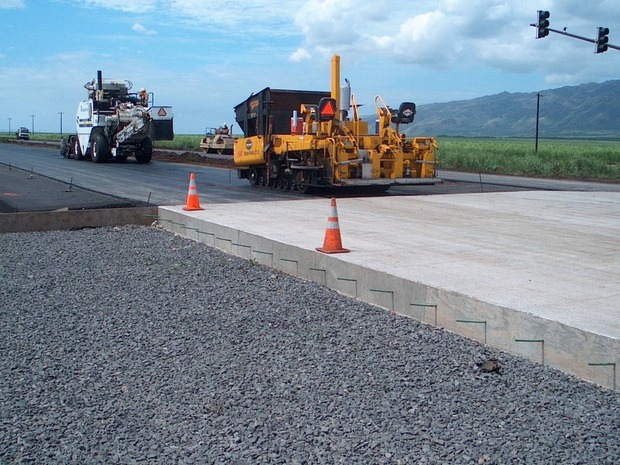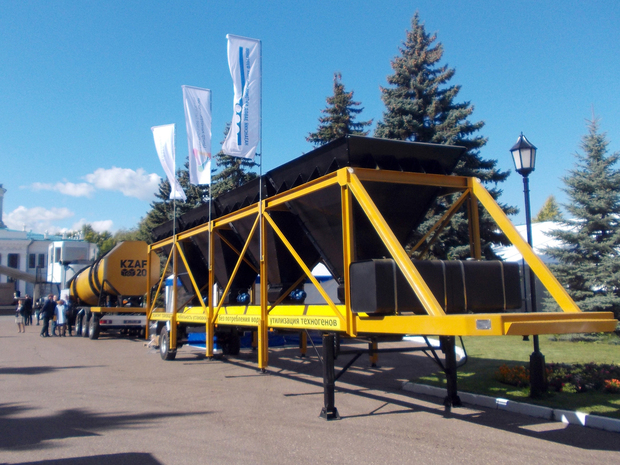Kazan Tiocomposite intends to buy up all sulphur from oil refiners
About how the Kazan company has learnt how to use sulphur residues in road building and construction of protective structures
The world oil and gas processing generates about 70 million tonnes of sulphur annually. 50 million tonnes out of them are consumed as a raw material for the production of sulphuric acid, fertilizers, plant protection agents and other chemicals. Accordingly, 20 million tonnes remain unclaimed. In the Middle East regions alone, which produce best oil by its characteristics, there have been accumulated more than 12,5 million tonnes of sulphur surpluses. In the regions that produce sour crude oil, in particular, in the USA and Canada, these figures are more substantial. The question is – what to do with all these accumulated 'goodness'? The answer: the biggest consumer of the surpluses could be the road and protective structures construction industry. A Kazan company Tiocomposite states about its readiness to take all sulphur surpluses, produced in the result of processing of viscous sour oil, that is 300 thousand tonnes of the mineral.
Backward Russia
An idea of using sulphur in the construction is not new. For the first time, concrete, where as a binder — one of the two main components of the material, there was applied sulphur, was obtained in the 1930s. In the 1970s, the theme experienced its renaissance – at this time the American and Canadian road builders began to use sulphur concrete as an alternative to traditional asphalt concrete. Later Japan expressed its interest, which, in particular, started to use actively the material in the production of systems of sewage and water supply. The UAE, Saudi Arabia, Iran, Turkey have recently started to enter the market. Here, the sulphur concrete is also used in the construction of sewage systems, water supply and water conduits.
Russia has not entered this market yet, although in the former Soviet Union countries the subject is being 'supervised' by about 40 scientific groups, whose members have defended many Candidate and Doctoral theses. The material has not entered into the large-scale production because of an almost complete lack of innovation intermediaries between scientists and enterprises. Today its readiness to serve as a bridge has been expressed by Kazan company Tiocomposite LLC, established in 2014 as a joint venture of the Nanotechnology Centre of the Republic of Tatarstan and the Kazan plant of automobile vans.
A site for experiment
Director General of Tiocomposite Evgeny Khramov, a physicist by training, first started to study the topic of sulphur copolymers in 2004, when he worked as a researcher at the Kazan Federal University. However, at that time they studied its use in the rubber-technical industry. Subsequently the range was expanded, and Khramov with colleagues (many of them now work in the company) started working on the use of sulphur copolymers in the production of building materials. This work lasted for nearly 12 years. By the time of establishment of the company, Khramov and his colleagues had already had results that could be easily introduced in the production.
Subsequently, the company developed and built a pilot plant for the manufacture of products from sulphur concrete, the experimental works were carried out, which resulted in unique, according to Khramov, production technology of large-sized products from sulphur concrete. The first orders for the development of a technology of sewage and water supply systems were received from Kazakhstan.
The first contract of Tiocomposite LLC in the field of road construction was the order for laying of a 350-metre experimental stretch of road, which the company is to fulfill next year.

In this case, the main thing is that the slabs will be made of sulphur concrete, which properties allow to increase the duration of an overhaul period many times, and thus reducing operating costs.
Besides, Khramov claims that in addition to economy the use of artificial crushed sulphur concrete can partly solve enormous for the Republic problem of the shortage of branded crushed aggregates: annual demand of road builders of the Republic in the mineral is about 5 million tonnes, it is not mined on the territory of the region and its delivery from fields increases the cost of the mineral from 400 to 1,100 rubles per tonne.
However, it is quite difficult to enter and to gain a foothold on this market, given the price of a kilometer of road, so 'new comers' here are not awaited with open arms.
A serious obstacle for mass adoption of this technology in road construction is the regulatory framework that guides the sector: the roaders still work according to the legal standards and regulations developed and adopted in the 1970s. It is clear that the requirements of the documents 'born in the USSR' no longer correspond to the current loads on the road, traffic etc. However, in fairness it should be noted that recently by an initiative of Gazprom PJSC it has been developed two new standards – on modified sulphur and sulphur concrete mixtures and sulphur concrete, but this is only the beginning of a long journey.

Northern delivery
However, the road construction — though promising but not the only direction in which the company is going to develop.
'Now, great interest in the subject is shown by the mining companies, in particular Gazprom, Lukoil and RAO UES of Russia,' says Evgeny Khramov.
According to Khramov, the big technology is also interesting for the metallurgical enterprises, generating hundreds of thousands of tonnes of sulphur and that are forced to store it due to unduly expensive logistics.
'Huge deposits of sulphur have been accumulated, for example, by Norilsk Nickel. A solution — to build a plant for manufacture of products from sulphur concrete near the enterprise and supply them further to the North,' says the head of the company.
The only plant of Tiocomposite is a mobile plant that consists of several units located on four 16-meter automotive platforms.
The plant is a proprietary development of the company. In 2015, it was awarded the Grand Prix at the exhibition 'Gas. Oil. Petrochemistry'. Khramov did not disclose the cost of the design and construction of the plant, saying just 'tens of millions of rubles'. However, it's still at least twice cheaper than buying a branded analogue, 'sharpened' to work with imported modifiers. At maximum load, the plant is capable to produce 20 tonnes of products of sulphur concrete per hour.
'This is enough to satisfy current demand, but not enough to talk about serious orders. In this case, the performance needs to be at least five times more,' recognized Khramov.

Uncharted territory
Assessing the potential capacity of the market of the products from sulphur concrete, Evgeny Khramov cited the calculations of VNIIGAZ, according to which in 2020 the demand for the material in Russia will amount to no less than 1 million tonnes, and by 2040 — at least 10 million tonnes.
The Arctic will tell if not decisive but a very strong word — harsh Northern climate makes traditional building materials almost unusable. However, the South is also interesting, especially marine regions that require particularly resistant to the effects of salts materials for the construction of coastal and port facilities. Perhaps, the company will be able to enter the market of the APR countries, particularly Indonesia, Sri Lanka and Iran.
Khramov is quite modest in assessing the current financial performance of the company: 'Our turnover amounts to millions of rubles.' However, in the next three years the company's revenue, according to Khramov's estimates, should rise at least to 1 billion rubles: today Tiocomposit expresses its readiness — however, in the future — to process all produced in the Republic sulphur in the process of refining.
Part of the profits of the company should ensure the construction of mobile and stationary plants for the manufacture of products from sulphur concrete, the construction cost of which is estimated at 300 million rubles. As the main customers Khramov sees, again, oil extraction, refining and metallurgical enterprises generating hundreds of thousands tonnes of sulphur.